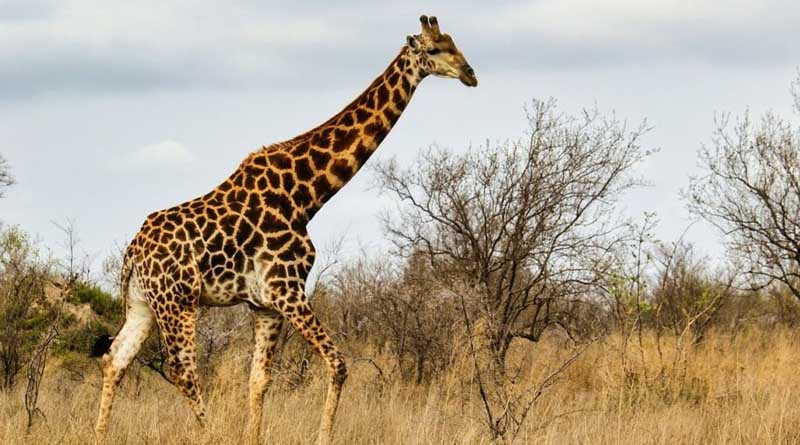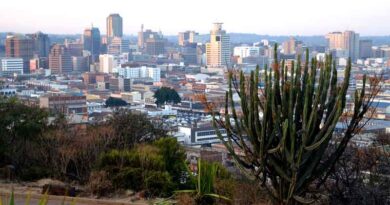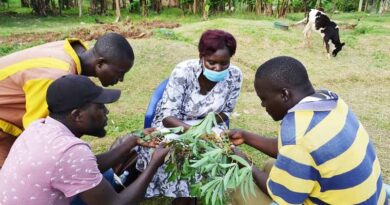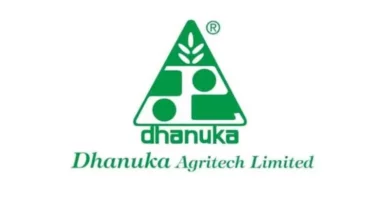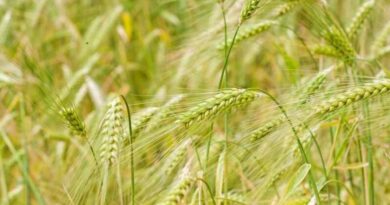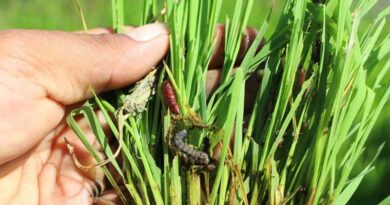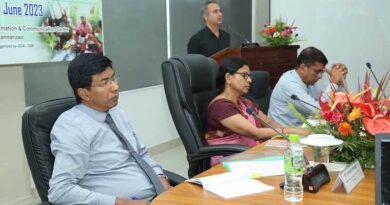Plant health knowledge helps residents of wildlife conservancy turn from poaching to farming
27 July 2023, Zimbabwe: Simalaha Community Conservancy aims to protect endangered wildlife. However, several years ago, it faced a big challenge. People living within the parks’ boundaries were poaching animals for food and income. The Conservancy is managed by Peace Parks Foundation. They addressed the problem by helping residents to shift from poaching to smallholder farming. But in 2020, the smallholders faced a threat: plant pests and diseases were destroying their crops.
The Conservancy reached out to CABI for plant health advice and support. Its goal was to support farmers and ensure they did not revert to poaching. The Peace Parks Foundation has pointed out that, “People do not care about wildlife if they are hungry.” Addressing hunger in a sustainable way can help to resolve other challenges such as poaching. CABI jumped at the chance to the support the community, delivering plant health knowledge through PlantwisePlus.
What’s Simalaha Community Conservancy?
Simalaha Community Conservancy is based in Zambia. It’s located next to the Zambezi River, bordering Namibia. As a conservancy, it’s dedicated to preserving natural resources. This includes fish in the Zambezi River. Conservancies usually protect ecosystems, land, water, and wildlife. They do this through land acquisition, education, management, and research. And they advocate for sustainable conservation practices.
Simalaha Community Conservancy aims to re-establish wildlife populations. It also safeguards migration routes. It protects many species of endangered animals, inducing antelope, buffalo, and giraffe. It’s part of the Kavango Zambezi Transfrontier Conservation Area. At 180,000 hectares, this is the world’s most extensive terrestrial cross-border conservation system. It connects 36 protected areas across Angola, Botswana, Namibia, Zambia, and Zimbabwe.
From poaching to farming
In 2020, following the construction of a fence to enclose endangered wildlife, the Conservancy contacted CABI. Staff had noticed that people were poaching animals within the enclosures. The Conservancy supports the residents’ shift from poaching to farming. It helps them become successful smallholder farmers, providing residents with agricultural inputs such as seeds.
On the Conservancy, the farmers learn how to grow a wide range of crops. This includes beans, cabbages, eggplants, ground nuts, maize, sorghum, and tomatoes. They also grow fruit trees, such as orange trees. However, challenges began to arise. The farmers started to experience problems with plant pests and diseases.
Bringing Plantwise to the Conservancy
The Conservancy approached CABI for help addressing the crop pests. PlantwisePlus offered plant doctor training and the development of reference materials like pest management decision guides. Training in carrying out plant health rallies was also offered to build the capacity of farmers.
The COmON Foundation funded the work. Plant doctors are agricultural advisors, trained to diagnose and provide recommendations for plant health problems. They assist farmers by identifying pests, diseases, and other plant health-related issues. This includes plant nutrient deficiencies. Then they offer practical, sustainable solutions.
Plantwise trained agricultural staff and lead farmers on two modules. Module one focused on the diagnosis of plant health problems and how to run plant clinics. Module two looked at how to give good pest management recommendations based on integrated pest management (IPM). Most attendees were trained as lead farmers. These are farmers who are very active in farming, whose work is considered exemplary, and are able to help others.
CABI recommended that the Conservancy bring in government extension staff to support the lead farmers. These professionals could provide backstopping agricultural expertise and knowledge to the lead farmers. They could assist them in adopting modern farming practices to boost their productivity.
Under PlantwisePlus, CABI trained the first group of lead farmers and agricultural staff of Simalaha Community Conservancy. The Peace Parks Foundations soon wanted to expand the training to the whole Conservancy. In total, CABI taught 36 people in modules one and two. Those who passed exams for both modules became plant doctors.
In early 2023, more lead farmers and agricultural staff of Simalaha were trained in Module one, two, and biocontrol. Plus, they were also trained in how to run plant health rallies. This included how to prepare materials for the rallies. A practical session was also held for farmers in the conservancy.
Supporting the Conservancy’s famers with biocontrol advice
CABI also trained the farmers in biological control (biocontrol). This is the use of living organisms to manage pests or invasive species. It uses beneficial insects and microorganisms over pesticides. It’s an environmentally friendly alternative to chemical pest control. And it promotes natural ecological balance to reduce crop damage.
Biocontrol wasn’t originally part of the project. However, CABI decided to deliver biocontrol training for one main reason. The Conservancy was, understandably, cautious about using pesticides around the wildlife. They wanted to keep harmful chemicals as far away as possible from the area. Biocontrol turned out to be the best and safest option.
The biocontrol training focused mainly on methods using beneficial insects – often called “farmers’ friends”. CABI trained lead farmers and agricultural staff in how to boost the numbers of these natural enemies. This included using CABI-developed tools for selecting biological pesticides (biopesticides). It also helps farmers select the least toxic pesticides when needed. These types of natural pesticides are less harmful to wildlife. They include parasitoids – insects that live off crop pests. They also included beneficial pollinators and tiny insect predators that kill crop pests.
There are many benefits to biopesticides. Not least, they are better for aquatic environments and organisms. This was important given the proximity of the Conservancy to the Zambezi River. The park also protects fish.
Holding plant health rallies at the Conservancy
In addition to the plant health training, CABI also took the residents through a mini-training in plant health rallies. Plant health rallies are community events. They raise awareness about plant diseases, pests, and the importance of plant health. Promoting preventive measures and knowledge sharing is critical. These measures help farmers to safeguard crops and ensure food security.
Together with the trainees, CABI selected topics for the rallies. Trainers showed the trainees how to prepare mini fact sheets in local languages understood by farmers. These information resources can be shared with farmers at the rallies. They show farmers how to recognize and manage plant pests. They learned how to deliver that message in just five minutes.
In 2023, CABI held a plant health rally in the community, and it attracted a lot of interest. Many farmers attended to ask questions about their crops. Even traditional leaders from the area – the chiefs – visited the rally. This was a very special moment for the trainers and rally participants. The local community plans to hold more plant health clinics and rallies in future.
Knowledge sharing for the benefit of the Conservancy
The knowledge sharing is working. When farmers face plant health issues, they now bring photos or samples of their crops for diagnosis. CABI staff say how exciting it is to see it working. And when the farmers can grow food, they’re less likely to poach.
The emphasis on sustainability is good for the Conservancy. CABI is helping the people who live and work there to minimize pesticide use and use safer alternatives. CABI has also been able to provide the people living there with targeted reference materials. This includes pest management decision guides and fact sheets. Last year, CABI helped the community create specific extension materials. This included for example, training on how to develop tea manure from chicken droppings. The tools CABI provided, including the PlantwisePlus Knowledge Bank, are helping share the knowledge even further.
Also Read: ITC releases an exclusive postal stamp on Millets in collaboration with India Post
(For Latest Agriculture News & Updates, follow Krishak Jagat on Google News)

